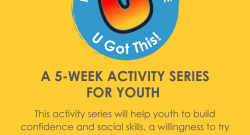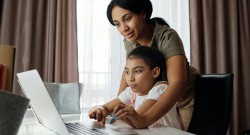Author: Tija UPOPOLIS
Sign up today for U Got This! An activity series to help you “put yoUrself out there”
In May 2020, we introduced the U Got This! Challenge, a weeklong virtual activity series to help youth cope with the challenges associated with COVID-19. We’re excited to announce our 3rd annual, starting November 14! This time, we’re helping youth to “put yoUrself out there” with a 5-week activity series led by our team. The goal is to help youth regain confidence, social skills, a willingness to try new things, and spreading kindness now that we are able to reengage in social activities. You do not have to be a Upopolis user to participate.
Here is how it works:
- 5 activities sent out via e-mail on the Monday of each week beginning November 14th, 2022
- E-mails will contain everything youth need to participate in the activity virtually: a video lesson, handouts, and any other important information
- Participants will be invited to work on photo projects, art pieces, coping skills and other exciting activities
A little sneak peek into our weekly themes…
Kindness – two activities will focus on spreading kindness! We challenge you to get crafty, and spread kindness for 7 days. Do you think you can do it?
Goal Setting – goals give us something to work towards, keep us motivated, and if we’re lucky, something to celebrate!
Building Social Skills – entering social settings with people you don’t know can be scary. Together we’ll work on ideas and tips to help you cope and work through these experiences.
… and more!
Youth do not have to be part of our Upopolis community to join, the workshop is FREE, and it is facilitated entirely by certified child life specialists who are trained to support children and youth through life’s challenging events.
Do you want to take part, or know a youth who would benefit? E-mail support@upopolis.com to let the team know, “I want in!”
How to: Build Confidence in Teens
Everyone struggles with self-doubt at one point or another. For youth, though, it’s especially more common as they search for independence and their own identity; both completely normal parts of teenage development.
As teenagers strive for independence, they can simultaneously want acceptance from their parents, friends, and those around them. Research shows links between the perceived acceptance we feel from others and self-esteem. Teens who display positive self-esteem and a sense of confidence are better equipped to take healthy risks, problem solve and try new things.
However, helping our teens feel accepted and confident isn’t always so easy to do. Their brains are going through significant development as they find their own identity; to add to that, they’re also trying to re-organize everything they’ve ever learned as they find their sense of self. This leaves us, as guardians, struggling to influence them in a positive way.
Here are 15 easy tips from the Big Life Journal to help you support the youth in your lives – to help them feel accepted, build up their confidence, and foster their self-esteem, so they can grow into happy, self-aware adults!

Have you taken a mini-vacation lately?
This week, on November 3rd, the world acknowledged International Stress Awareness Day – a day to increase awareness of the impact of stress on our bodies and mental health, and to continue to educate and learn ways to decrease its negative impact.
The Canadian Institute of Stress reports that those who take time daily to “be good to yourself” decrease their stress by almost half. Wow! So what do you do during your day to help with stress levels?
Wouldn’t going on vacation every day be nice?
It sounds unrealistic… but we’re not talking about a trip that requires an expensive plane ticket, a hotel or an itinerary.
We’re talking about a daily mini-vacation… a moment in your day that you set aside to do something purely out of leisure and enjoyment. For most people, we wait weeks and months for this to happen. We work through long, stressful days, counting down the moments until we can do something extraordinary. What kind of life is that, always counting the days away until something better comes along?
That’s why we’re encouraging you to take a daily mini-vacation. With just 20-30 minutes, you can enjoy the same happiness, enjoyment, and leisure that you do while you’re on a REAL vacation. Here’s how:
- Schedule the time. Vacations are positive for our mental and physical health; they prevent burnout, boost happiness, and refresh us. But like anything, we need to make the time and be consistent. Set aside time in your day for your mini-vacation and be realistic about it. 20 minutes is manageable, and just enough to give you that little boost of energy.
- Get rid of the distractions. Vacations seem so rejuvenating because we don’t have any distractions; we usually don’t keep our phone or computer on us. Try to remove any of these distractions during your 20 minutes.
- Do what you love. Your daily mini-vacation doesn’t have to be extravagant. Do you love coffee? Check out a local coffee shop. What about being outdoors? Seek out a new trail. Is there a book you’ve been meaning to read? Set time aside to finally open it’s pages. Your mini-vacation is whatever brings you the most joy. For us, that’s doing something different than our usual day-to-day routine… something that we can look forward to.
Daily mini-vacations take effort and consistency to stick to, but it’s time you prioritize your happiness and well-being… and it only takes 20 minutes a day!
Helping youth navigate grief online
Have you seen our published article on the TELUS Wise website?
TELUS Wise is a free education program that offers Canadians of all ages access to resources and workshops (again, at no charge!) to help promote positive digital literacy and online safety.
They have tons of blog posts, workshops, resources and tips to help children, youth and adults navigate the online world.
We joined them with our latest article about helping youth navigate their grief in the online world. Check it out here: https://www.telus.com/en/wise/resources/content/article/helping-youth-navigate-grief-online
For more information about TELUS Wise and to access their free education programs and resources, visit their website: https://www.telus.com/en/wise
Youth Takeover! “The Social Model, Oversimplified” by Caelin
The way both disabled, and non-disabled people view disability can vary greatly. Different people with different mindsets, upbringings, lived or learned experiences & confidence levels; these things all shape how a person views disability. Generally, people’s views of disability fall into one of two categories: the medical model, and the social model.
In brief, in the medical model of disability, the person is disabled by their impairment, and emphasis is placed on a ‘cure’ or ‘almost cure.’ The person should adapt to their world. The medical model can create a mindset completely focused on cure and may cause people to feel broken or less-able.
In the social model, ‘disabled’ and ‘impairment’ are not the same. This model says that the person is not disabled by their impairment, but rather, their environment or society that is not accessible to them. It means disabled people are seen as equals and looked at for their abilities and meaningful achievements.
For example, under the social model, if I’m in a restaurant that has an electronic menu, I am not disabled in that situation; if they didn’t have an accessible menu, I am disabled in that situation, because the environment isn’t accessible to me, not because of my visual impairment. If I’m in class, and I’m not provided with digital materials, I am disabled because they’re not accessible.
I subscribe to the social model. It’s very freeing and solidifies that I am not the problem or in need of a cure, but society should be made accessible to me. Not only that, but able-bodied have a genuine, selfish interest in universal design as well, known as the ‘curb cut phenomenon;’ curb cuts help people in wheelchairs, but also cyclists, skateboarders, and parents pushing baby strollers. We all benefit when everyone is given equitable access.
Caelin is a Upopolis user. He has oculocutaneous albinism, which causes his eyes to have light sensitivity, poor visual acuity and no depth perception. Caelin has been teaching us about visual impairment since he joined Upopolis, and has also kept us laughing with his jokes and humour!
5 interventions to get the youth in your life TALKING!
Sometimes, as an adult, it may be challenging to connect with youth. As youth grow older, they’re finding their independence. It’s natural for them to begin to explore relationships with friends and themselves. They’re interested in things we have trouble relating to and sometimes it’s as though they can’t even be bothered talking to us!
However, research show youth who share their emotions have better mental health. They’re more likely to talk openly about any problems they might be facing in their life, which gives us the opportunity to help them with cope with these challenges.
On Episode 10 of the Upopolis Podcast, our host Krista Naugler offers 5 therapeutic interventions for youth. With over 24 years of experience working with youth in many settings, Krista is able to identify her tools of the trade for helping youth connect with themselves, with others, and with you!
Whether you’re a child life specialist, parent, teacher, or service provider in the community, you’ll find these interventions helpful for your practice. Read on to learn the top 5 that Krista suggests using when working with youth:
1900’s texting – who are the people that make up this youth’s support system?
We know youth are into their devices, so meet them where they’re at. For this intervention, you can either use a real device or use old school pen and paper.
Have the youth write down something that they would like to say to someone who has been there for them, sort of like a note of thanks or acknowledgement. Then have them read the note to that person or send them the actual text. This gives them an opportunity to reflect on the supports they have available and to practice sharing with those people their feelings and gratitude. Bonus, they’ll see how touched everyone is to receive a note of thanks!
Fingerprint stories – helping our youth share a story, thought or feeling
This intervention requires an ink pad and a photo copier. Make an ink print of the youth’s finger or thumb print, then photocopy and enlarge it until it fills the better part of an 8×10”
paper. Place a blank white piece of paper over top of the enlarged photocopy and place on a window or lightboard (you may need tape). Give the youth a theme and have them write a story following the lines of their fingerprint. They can write about their experiences, feelings, dreams, an adventure, or a theme related to a goal you have for them. Once they have filled the fingerprint lines with their story, remove it from the light source and decorate it!
Learning from our youth – connect with them by having them teach you something
Ask the youth to teach you something new, like a favourite game they have! This helps them be the expert in something and gives them back a sense of control. An alternative is learning something new together, like coding. This provides them with something to learn and focus on, which is especially helpful if you need to encourage them to focus their time and energy into something positive.
Graphic design – youth can express themselves or educate others
There are TONS of apps and web-based programs for creating graphics; PicCollage, Canva and Smilebox to name a few. Helping youth design things like t-shirt logos, recipe cards and journal pages gives them an expressive outlet. It’s also another way to help youth feel like the experts if they plan to create something to help educate family or people in their class. You will be so surprised with what youth come up with!
Upopolis – connecting youth online with peers
Upopolis is a way to connect youth with others who are experiencing similar or the same journeys in life. We have spaces for youth with a chronic or critical illness/disability, a space for their siblings, and a space for youth who are grieving the death of a loved one.
A bonus of Upopolis is that youth get to help create content for the website and social media, they can access vetted medical content, and they can gain amazing experiences like volunteering, guest starring on our podcasts, and cowriting a blog.
If you have any questions about anything on this list, find us on social media @upopolis or send us an e-mail at support@upopolis.com. Happy creating!
Halloween Happenings: How to explain (and celebrate) this year’s new traditions!
We know, Halloween 2020 is going to be very different this year. We could not have imagined back in March that we would still be faced with a pandemic almost 8 months later! But here we are, trying to flatten the COVID-19 curve while also trying to normalize the world for our children. It’s been a long year, but you’ve come this far! Congratulate yourself.
We don’t know how long this new normal will last, but we do know how important it is to continue to celebrate holidays and family traditions even if it means doing things different than last year. Always remember, children are resilient. You can, however, help them cope better by giving them simple and honest information about why things will be different this year.
You can help your children cope with changes associated with Halloween by following a few easy suggestions:
- Explain, in simple terms, why normal Halloween activities are unsafe right now. If you haven’t done so already, you may have to start with an explanation of COVID-19. Click this link for more information on how to do this: https://www.mayoclinic.org/diseases-conditions/coronavirus/in-depth/kids-covid-19/art-20482508
- Validate their feelings about cancelled/changed activities. It is normal for your children to be disappointed/frustrated/sad about not being able to trick-or-treat, go to costume parties, or celebrate with friends.
- Offer new suggestions for possible activities, and involve them in choosing how they will celebrate. This allows them to feel a sense of control over something that they don’t have much control over.
So, how do you celebrate Halloween if you can’t do traditional trick-or-treating (or whatever your Halloween heart may desire)? The Centers for Disease Control and Prevention (CDC) released guidelines around Halloween activities as many traditional Halloween activities can be high-risk for spreading viruses. With the help of the CDC, input from child life specialists, and youth users on Upopolis, we have compiled a list of alternative Halloween activities so you can continue to make family memories!
Lower risk activities:
- Carving or decorating pumpkins with members of your household
- Carving or decorating pumpkins outside, at a safe distance, with friends or neighbours
- Decorating your house, apartment or living space
- Doing a Halloween scavenger hunt either inside, or outside at a safe distance from others’ homes
- Having a Halloween movie night with treats
- Having a “Candy Hunt”, around your house, living space or yard; hide the treats and have your children search for them!
- Having a virtual Halloween contest with friends and family
- Baking then decorating Halloween themed cookies
Moderate risk activities:
- Visiting pumpkin patches or orchards where people use hand sanitizer before touching pumpkins or picking apples, wearing masks is encouraged or enforced, and people are able to maintain social distancing
- Participating in one-way trick-or-treating where individually wrapped goodie bags are lined up for families to grab and go while continuing to social distance
- Meeting with friends or neighbours, outside, to show off each other’s costumes at a safe distance, while wearing cloth or medical grade masks
How will you be celebrating Halloween this year? Your answer may be different than last year, but if spending time with loved ones is already part of the plan, you’re ahead of the game.
Happy Halloween!
4 Tips for Coping with the Potential Return of COVID-19 Restrictions
The third episode of our podcast, Upopolis: The Podcast, welcomed three child life specialists who also happen to be parents. Their experiences during the COVID-19 pandemic were all different, but they all parented with a unique lens: that of a child life specialist, whose role it is to help children cope with stressful life events.
In this latest episode, host and certified child life specialist, Krista Naugler, brought up the perhaps expected future of our community: the return of COVID-19 restrictions. As case numbers increase around the world, the possibility of returning to the “quarantine” life we dealt with in the Spring may be inevitable.
These working professionals shared the trials and tribulations of parenting during a world pandemic and how their behaviours and mindset were affected. Check out their takeaway tips from what they learned from the first time around so you can be prepared for the potential return of restrictions:
Tip #1: Vet your resources
Your children may be hearing so much information from different sources – their teachers, friends, family, or the news. Make sure you know where their information is coming from and if it’s factual. An explanation of a swab to test for COVID-19 may be explained very inaccurately by someone online than it would be from a hospital resource. “Check and vet” to keep your children in the know.
Tip #2: Be your child’s go-to for tough topics
Our children know more than they lead on. Although they may not always be open to talking about it, let them know that it’s OK to have tough conversations and that you are always here to support them and answer questions. If they ask questions, be honest with your explanations while continuing to reassure them that they are safe.
Tip #3: Practice gratitude
Some days will be really tough, and that’s OK. Take time at the end of each day to talk with your children about three really great things that happened. Emphasize their strengths, and pick out the small positives.
Tip #4: Always remember, you know your child best
Parenting is hard, especially during a world pandemic. This time has encouraged us to reexamine our expectations as a parent. Remember, you are doing what is best for your child. You know them best. Just because you might feel like you’re failing, doesn’t mean you’re not doing an awesome job. We’re all going to feel guilty, but every day is a new day and you are doing the best you can.
Check out Upopolis: The Podcast on Apple Podcasts or Spotify Podcasts, or by clicking this link: https://www.upopolis.com/en/resources/#podcasten
- 1
- 2







